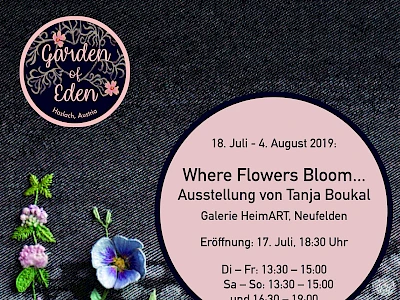Where flowers bloom...
| Date: | 17. Jul – 4. Aug 2019 |
| Venues: | heimart, Neufelden, Austria |
| Works: |
The dignity of man is the topic of Austrian artist Tanja Boukal’s works. Socially relevant and politically explosive issues, which revolve around exclusion, flight and violence, are expressed in various textile techniques, and direct the attention to a special aspect of the "Garden of Eden" theme.
Tanja Boukal travels to the trouble spots of this world. She often stays in refugee camps or war zones, and spends time with people in extreme situations. The impressions and photos from these experiences find expression in her works in manifold ways. She has a vast repertoire of craft skills, and uses traditional, often extremely time-consuming textile techniques such as embroidery or knitting as well as new technologies, which she playfully employs.
Tanja Boukal's works fascinate by their photorealistic power. They depict destinies, portraits and oppressive situations, which, though shown relentlessly, do not overexpose. She sometimes works on them for months, yet the briefness of the moment of the shooting of the photograph takes on an eternal note. The length of the manufacturing process dissects the events into individual embroidery stitches, knitting stitches or weft insertions, creating work that gets under one’s skin and exposes depths that lie hidden behind the sum of all these individual moments.
Tanja Boukal trained as an art embroiderer in Vienna, and studied stage design and decoration. Her love for craftsmanship and technical perfection permeates her work as well as her socio-political attitude. In her most recent cycle of works she deals with the language of flowers - also called floriography. This refers to a hidden communication through the use of certain types of flowers, which is symbolically charged, a language that was used in Asian culture, but also in Victorian England, to convey messages that could not be uttered otherwise in this rigid society. There were even dictionaries that allowed sender and recipients to translate the language of flowers. For the exhibition in Neufelden, Tanja Boukal embroidered gorgeous flowers on jacquard fabric, into which images of drowned refugee children are woven. Embroidered lavishly in the three-dimensional stumpwork technique that flourished in seventeenth-century England, these flowers speak of hate, fear, hope, death or rebirth, but can only be deciphered for those who engage in a new language.
The example of the flowers clearly shows that Tanja Boukal's work often captivates through the deliberate use of stark contrasts, through the irritation that arises when looking at what is supposed to be beautiful, and reveals its dark side only at a second glance. Just as the flowers at first look lovely and pretty and only communicate their black messages at a closer look, Tanja Boukal’s chosen textile medium has this ambiguity. Through its softness and everyday presence, a textile is often associated with intimacy, femininity and gentleness. The fact that a supposedly harmless needlework could carry a leaden content, shakes our classical approach to classification, creates new levels of meaning and touches in an immediate and disconcerting way.
This irritation is especially noticeable in her large work "Schutzwall" [protective barrier], which forms the heart of the exhibition in Neufelden. The installation consists of several panels, approximately 4 meters high, depicting mesh and barbed wire fences woven as in soft, cuddly terry cloth, which would invite one to nestle down. The installation makes the visitor part of a real situation in the city of Melilla, a Spanish enclave on the coast of North Africa. The city is surrounded by six- to seven-meter-high barbed wire fences that separate it from its Moroccan surroundings. Thousands of people have tried unsuccessfully to scale these fences in recent years in the hope of reaching the "Garden of Eden" of Europe.

























